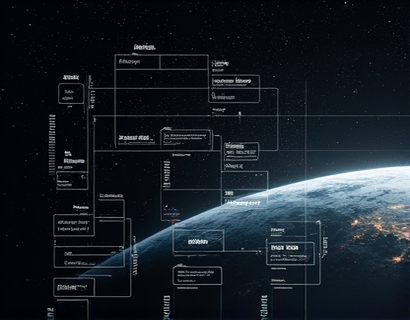Decentralized DAO Management: Leveraging Advanced Analytics for Enhanced Governance and Sustainable Growth
In the rapidly evolving landscape of decentralized finance and autonomous organizations, the role of governance has become increasingly critical. Decentralized Autonomous Organizations (DAOs) represent a novel approach to management, leveraging blockchain technology to create transparent, community-driven entities. However, effective governance in DAOs is complex, requiring robust tools and strategies to ensure efficiency, transparency, and sustainable growth. This article delves into how advanced analytics can transform DAO governance, providing administrators with the insights needed to make informed decisions and drive their organizations forward.
The Need for Advanced Governance Tools in DAOs
DAOs operate on a unique model where decisions are made collectively by token holders, often through smart contracts. While this approach promotes decentralization and community involvement, it also introduces significant challenges. Managing a DAO involves overseeing a vast network of stakeholders, ensuring compliance with protocols, and making strategic decisions that align with the organization's goals. Traditional governance methods are often inadequate for the scale and complexity of DAOs, necessitating advanced tools that can streamline processes and provide comprehensive analytics.
Advanced governance software is designed to address these challenges by offering a suite of features that enhance decision-making, improve transparency, and foster collaboration. These tools enable administrators to monitor real-time data, analyze trends, and predict outcomes, thereby empowering them to take proactive measures. The integration of advanced analytics into DAO management is not just a luxury but a necessity for organizations aiming to thrive in a competitive and dynamic environment.
Streamlining Governance with Advanced Software
One of the primary benefits of advanced governance software is the ability to streamline administrative tasks. DAOs generate a vast amount of data, from transaction records to proposal outcomes. Managing this data manually is impractical and error-prone. Advanced software automates data collection, processing, and reporting, freeing up administrators to focus on strategic decision-making.
For instance, automated workflows can be set up to trigger actions based on specific conditions, such as executing smart contract functions when certain thresholds are met. This automation reduces the risk of human error and ensures that governance processes are executed efficiently and consistently. Additionally, these tools often include user-friendly interfaces that simplify complex operations, making it easier for administrators of all technical backgrounds to manage their DAOs effectively.
Comprehensive Analytics for Informed Decision-Making
Data is the backbone of any successful organization, and DAOs are no exception. Advanced analytics tools provide deep insights into various aspects of DAO operations, enabling administrators to make data-driven decisions. These tools can analyze historical data, track real-time metrics, and forecast future trends, offering a holistic view of the organization's performance.
Key performance indicators (KPIs) such as token distribution, voting patterns, and community engagement can be monitored and visualized through dashboards. These visual representations make it easier to identify trends, spot anomalies, and assess the impact of governance decisions. For example, by analyzing voting behavior, administrators can gain insights into the effectiveness of their communication strategies and the level of community engagement, allowing them to adjust their approaches accordingly.
Enhancing Collaboration and Transparency
Collaboration and transparency are cornerstones of successful DAO governance. Advanced governance software fosters these values by providing platforms where stakeholders can interact, share information, and collaborate on proposals. These tools often include features such as discussion forums, voting mechanisms, and transparent record-keeping, ensuring that all members have access to the same information and can contribute meaningfully to decision-making processes.
Transparency is crucial in building trust within the DAO community. By leveraging blockchain's inherent transparency, governance software can ensure that all transactions and decisions are recorded and accessible to all members. This level of openness not only enhances trust but also deters malicious activities, as all actions are traceable and verifiable.
Driving Sustainable Growth Through Data-Driven Strategies
Sustainable growth in DAOs requires a strategic approach that balances short-term gains with long-term stability. Advanced analytics play a pivotal role in this process by providing administrators with the insights needed to make informed decisions that align with the organization's goals. By analyzing market trends, community feedback, and operational metrics, administrators can develop strategies that drive growth while maintaining the integrity and resilience of the DAO.
For example, predictive analytics can help identify emerging opportunities and potential risks, allowing administrators to proactively adjust their strategies. By leveraging machine learning algorithms, these tools can uncover patterns and insights that might not be apparent through manual analysis, providing a competitive edge in a rapidly changing landscape.
Case Studies and Real-World Applications
Several DAOs have successfully implemented advanced governance tools, demonstrating the tangible benefits of these solutions. One notable example is a decentralized governance platform that integrated advanced analytics to manage community proposals and voting processes. By analyzing voting patterns and community sentiment, the platform's administrators were able to refine their communication strategies, leading to higher participation rates and more aligned decision-making.
Another case involves a DAO focused on sustainable projects, which used predictive analytics to identify high-impact initiatives. By focusing resources on projects with the greatest potential for positive environmental impact, the DAO not only achieved its goals but also built a stronger, more engaged community. These real-world applications highlight the transformative potential of advanced governance tools in enhancing DAO performance and sustainability.
Challenges and Considerations
While the benefits of advanced governance tools are clear, there are challenges and considerations that DAO administrators must address. One key challenge is the adoption and integration of these tools within existing governance frameworks. Ensuring that all stakeholders are comfortable with new technologies and processes is essential for successful implementation.
Another consideration is the security and privacy of data. Governance tools must adhere to strict security standards to protect sensitive information and prevent unauthorized access. Additionally, the complexity of these tools can sometimes create a barrier to entry, requiring comprehensive training and support to ensure that administrators can fully leverage their capabilities.
Future Trends in DAO Governance
The future of DAO governance is poised for further innovation, with advancements in technology continuing to shape the landscape. One emerging trend is the integration of artificial intelligence (AI) and machine learning (ML) to enhance decision-making processes. AI can automate more complex tasks, such as scenario planning and risk assessment, providing administrators with even more powerful tools at their disposal.
Another trend is the development of interoperable governance platforms that can seamlessly integrate with other blockchain projects and ecosystems. This interoperability will facilitate collaboration across different DAOs, creating a more connected and cohesive decentralized landscape. As the ecosystem evolves, the role of advanced analytics will become increasingly central, driving continued growth and innovation in DAO governance.
In conclusion, advanced governance tools and analytics are transformative for DAOs, offering a path to enhanced governance, collaboration, and sustainable growth. By embracing these technologies, administrators can navigate the complexities of DAO management with greater ease, making informed decisions that benefit the entire organization. As the landscape continues to evolve, the importance of these tools will only grow, solidifying their place as essential components of successful DAO governance.










































